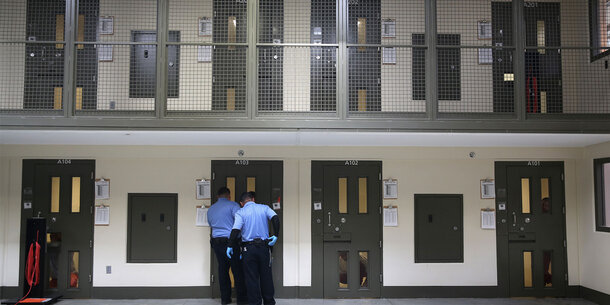American University Washington College of Law professor Angela J. Davis was one of the first to identify the bedrock principles that spurred a change in how prosecutors wield their discretion. In a 2019 article, she wrote, “In a country plagued by mass incarceration, racial inequities, and other injustices, the goal should be a fair and just criminal justice system with a much lower incarceration rate. Although radical change is desirable, it may not always be possible. Progress toward this goal should be the hallmark of the progressive prosecutor.”
While almost unfathomable in the early 1990s, prosecutors promising to improve public safety while reducing our reliance on incarceration have now been elected in big cities and rural areas alike. Thirteen of those prosecutors are featured in a stunning new book, Change From Within: Reimagining the 21st-Century Prosecutor, edited by Miriam Krinsky, the executive director of Fair and Just Prosecution, a network of elected local prosecutors committed to promoting a justice system grounded in fairness, equity, compassion, and fiscal responsibility. In the book, these prosecutors reflect on what drove them to become catalysts of criminal justice system reform.
Despite recent attempts across the United States to reduce unnecessary incarceration, nearly 1.2 million people are currently in federal and state prisons, and approximately 700,000 more are locked up in local jails. Decades of overincarceration have destroyed communities and lives, and this misguided approach to criminal justice continues to perpetuate intergenerational poverty.
It is against the backdrop of a failed criminal justice system that prosecutors share their stories of transformation. Work by formerly incarcerated artists introduces each of the 13 essays, adding a beautiful and poignant illustration of the need to include lived experiences in the stories that define justice in our communities. One of the most striking images was created by Antonio Howard, who depicts Cook County, Illinois State’s Attorney Kim Foxx holding a brick from the Cabrini-Green public housing complex in Chicago, etched with her grandmother’s birthday. Foxx keeps the brick on her desk to remind her of her roots and the people she serves. The illustrations are tied to the stories many of these elected officials tell about their own connections to the harms of the overly punitive U.S. justice system: former San Francisco District Attorney Chesa Boudin grew up with both of his parents in prison; Foxx’s mother suffered from mental health and substance abuse disorder issues; Brooklyn, New York District Attorney Eric Gonzalez lost a brother to gun violence; and Wyandotte County, Kansas District Attorney Mark Dupree Sr. stood trial for a crime he didn’t commit.
In explaining why she ran for office, becoming the only Black person elected state’s attorney in Illinois, Foxx said, “I felt that too many people in these positions have no real personal connection to the work.” Echoed throughout the essays is a recognition that the justice system abjectly fails to reduce harm to victims and defendants. These prosecutors all share a desire to eradicate prosecutions of crimes of poverty and ensure the justice system doesn’t punish people for drug addiction or mental health challenges.
Many of the reflections also detail hate mail, threats against the prosecutors and their families, and even death threats. The media accused those who worked to hold police accountable for misconduct of being anti–law enforcement. Police unions spearheaded smear campaigns against them. Following the Freddie Gray murder trial, Baltimore County, Maryland State’s Attorney Marilyn Mosby described “an enormous binder filled with hate mail and death threats.”
The book is remarkable in that these prosecutors see themselves as what Dupree calls “ministers of justice.” Knowing they may not have long in office — Boudin, for example, was recalled by voters in June — they are fervently driven to make as much long-term change as they can in a race against time and a constantly changing political environment.
In 2017, Foxx used her discretion to stop prosecuting people for driving on suspended licenses for failure to pay tickets. Taking a stand on this issue helped change momentum statewide — last year, Illinois eliminated driver’s license suspension for those who were unable to pay traffic tickets. Foxx has also revolutionized how prosecutors’ offices deliver data transparency about their decision-making process, most recently releasing a felony dashboard that provides information about felony prosecutions from 2011 to today.
Gonzalez was the first in the country to implement a policy to protect immigrants from deportations in criminal cases. Mosby’s decision to prosecute police officers in the Freddie Gray case resulted in reforms to the Baltimore Police Department, including new use-of-force and de-escalation policies, full implementation of body cameras on all police officers, and the requirement that officers call a medic when someone in their custody requests one. Chittenden County, Vermont State’s Attorney Sarah George led her office to become the first in the nation to stop arresting and prosecuting people for the possession of buprenorphine/Suboxone, a medicine used to treat opioid use disorder. Working with law enforcement and medical agencies, the county’s overdose death rate dropped 50 percent despite increasing statewide. Many of these 13 prosecutors created conviction integrity units, which investigate claims of actual innocence. These are just some of the policy changes that prosecutors featured in the book have implemented during their time in office.
Santana Deberry, district attorney for Durham County, North Carolina, said, “You’ve got to make the system work differently: you need to apply the law in a way that sees the people who are convicted of crimes as members of our community who need help — and not outsiders who deserve punishment. We’re just looking at them as people.”
Robert Ferguson, the late Columbia University professor in law, literature, and criticism, wrote in his 2014 seminal book, Inferno: An Anatomy of American Punishment, “the separations in the function of punishment mean that no single official ever has to look directly into the abyss. No one punisher need feel the full burden of creating suffering.” These 13 elected officials reveal how they are trying to work with their communities rather than shielding themselves from the horror and dysfunction of the U.S. punitive justice system. In fact, they are all looking into the abyss and trying to pull our communities out of it. Change from Within provides a glimpse into the challenges reform-minded prosecutors face yet offers hope that these leaders can leave an indelible mark on our justice system that outlasts their tenure in these roles.



